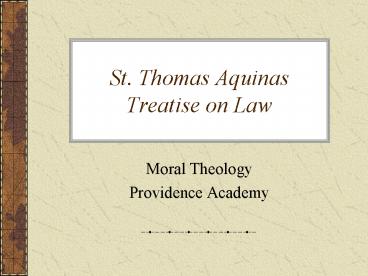St' Thomas Aquinas Treatise on Law - PowerPoint PPT Presentation
1 / 20
Title:
St' Thomas Aquinas Treatise on Law
Description:
What does this objection mean? ... 'Because I said so!' embodies this view of law. Why ... Preamble to the American constitution lists a series of 'common goods. ... – PowerPoint PPT presentation
Number of Views:377
Avg rating:3.0/5.0
Title: St' Thomas Aquinas Treatise on Law
1
St. Thomas AquinasTreatise on Law
- Moral Theology
- Providence Academy
2
Definition (essence) of Law
- An ordinance of reason
- for the common good,
- made by him who has care of the community,
- and promulgated.
3
Why an ordinance of reason?
- Objection 3 Action is directed by will, not by
reason. - Support Whatsoever pleases the prince, has
force of law, quoted from Digest of Civil Law.
4
What does this objection mean?
- If law comes from the will, rather than from
reason, it has no justification except for force. - Because I said so! embodies this view of law.
5
Why is Law an ordinance of Reason?
- Reason provides the standard for right action,
e.g. fairness, justice - Hence, law must be rational, not just a matter
of personal desire. - Just laws are reasonable, while tyranny is
irrational.
6
How does St. Thomas respond to the third
objection?
- If the will of prince is truly to be a law, it
must agree with right reason, e.g. justice. - Otherwise, the sovereign's will would savor of
lawlessness rather than of law.
7
How is Law for the common good?
- By common good, St. Thomas does not mean many
or most but all. - A park or a highway is a public good but not a
common good it can only serve so many at
once. - Peace is a common good it is belongs to
everyone at once without growing less.
8
On the contrary
- St. Thomas cites the teaching of St. Isidore from
the Etymology (a kind of medieval encyclopedia) - Laws are enacted for no private profit, but for
the common benefit of the citizens.
9
Preamble to the American constitution lists a
series of common goods.
- Establish Justice,
- Insure domestic Tranquility,
- Provide for the common defense
- Promote the general Welfare, and
- Secure the Blessings of Liberty to ourselves and
our Posterity
10
Why must law be ordered to the common good?
- Reason orders mans actions to his end, that is,
happiness. - But every man is part of a whole, namely the
whole community. - Therefore, law must order man to happiness of
whole community, not just individuals.
11
What happens when laws do not serve the common
good?
- When laws do not serve the common good, they are
considered unjust! - dictatorship, oligarchy, facism, mob rule are
all forms of government where the few or many
benefit, but not all.
12
Why do we need authority?
- Objection two Cannot anyones reason lead a man
to right action? - Implication We dont need authority everyone
can figure out for themselves the best way to
live.
13
Authority flows from needs of the common good!
- 1) Law is for the sake of the common good.
- 2) Care for the common good belongs to the whole
people or some representative. - 3) Therefore, law must be made by the people or
some representative.
14
No society can function without authority
- Sports teams need coaches
- Picnics need organizers
- Clubs need officers
- Authority is not a necessarily evil no
society without authority
15
Reply to the second objection(isnt private
reason enough?)
- Private advice is not enough
- The law must have coercive power!
- this coercive power is vested in the whole
people or in some public personage, to whom it
belongs to inflict penalties.
16
What is promulgation?
- promulgate (prom el-gat , prom ul gat )
- 1. To make known (a decree, for example) by
public declaration announce officially. - 2. To put (a law) into effect by formal public
announcement.
17
Laws are established when they are promulgated."
Why?
- In order that a law obtain the binding force
which is proper to a law, it must needs be
applied to the men who have to be ruled by it. - Such application is made by its being notified to
them by promulgation. - Wherefore promulgation is necessary for the law
to obtain its force.
18
Ancient law codes were often placed prominently
in temples
- The Code of Hammurabi (pictured) is from 1750 BC.
- "Anu and Bel called by name me, Hammurabi, the
exalted prince, who feared God, to bring about
the rule of righteousness in the land."
19
The difficulty of modern law is its complexity
and unknowability
20
From all this, St. Thomas lays down the
definition of law.
- An ordinance of reason
- for the common good,
- made by him who has care of the community,
- and promulgated.

